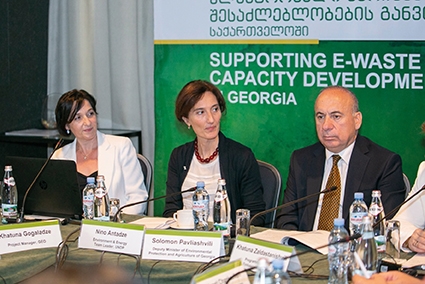UNDP, Government of Sweden Promote Extended Producer Responsibility in Georgia
E-waste management under the Extended Producer Responsibility (EPR) in Georgia is the focus of a new project launched this week by the United Nations Development Program (UNDP) and the Government of Sweden, in cooperation with the Georgian non-governmental organization GEO (Georgia’s Environmental Outlook) and the Ministry of Environmental Protection and Agriculture.
The kick-off meeting on 19 June brought together representatives of the Georgian Government, civil society and international agencies.
Solomon Pavliashvili, Deputy Minister of Environmental Protection and Agriculture of Georgia; Nino Antadze, UNDP Environment & Energy Team Leader in Georgia; and Khatuna Zaldastanishlivi, Program Officer at the Embassy of Sweden, addressed the participants of the meeting with welcome remarks.
Khatuna Gogaladze, Head of the GEO, presented the main directions of the planned activities, as well as the prospects and challenges associated with the introduction of Extended Producer Responsibility (EPR) in Georgia.
The 16-month initiative aims to support the practical implementation of the EPR principle in e-waste management once it enters into force on 1 December 2019. It will assist Georgia to finalize a by-law on waste electrical and electronic equipment (WEEE), conduct an inventory and strengthen capacities of the informal WEEE stakeholders, and establish an E-waste Producer Responsibility Organization (PRO).
The project builds on the achievements on the previous work undertaken by UNDP, the Government of Sweden, the Ministry of Environmental Protection and Agriculture, and GEO in 2017-2018 to promote EPR as part of Georgia’s Waste Management Code.
The project activities will be implemented in close partnership with the key national and international stakeholders – governmental institutions, the private sector, civil society and international agencies.
Every year, Georgia generates around 900,000 tons of municipal waste. This waste contains up to 1,000 non-hazardous and hazardous substances which pose a threat to human health and the environment.
EPR is a policy approach successfully implemented throughout Europe. Under this instrument, producers and importers take responsibility for the collection and treatment of specific waste.
In Georgia, the principle of Extended Producer Responsibility is part of the Waste Management Code, adopted in December 2014. EPR enters into force from 1 December 2019 for the following specific waste streams:
- packaging waste (plastic, paper/cardboard, wood, metal, glass),
- waste electrical and electronic equipment (WEEE),
- end-of-the life tires (ELTs),
- end-of-the life vehicles (ELVs),
- used oils,
- used batteries and accumulators.
EPR is a new concept for Georgia and its introduction requires a relevant legal framework and adequate awareness of the public and private sector.
In 2017-2018, by the initiative of the Government of Georgia and with the support of the UNDP and the Government of Sweden, the project on “Supporting the introduction of Extended Producer Responsibility (EPR) principle as required by the Waste Management Code” was implemented by the Georgian Non-governmental organization ‘Georgia’s Environmental Outlook’ to assist the implementation of legal requirements. A number of studies were conducted, and various documents prepared under the project, such as the EPR Manual, e-waste volumes: status and future trends, e-waste recycling feasibility study in Georgia, e-waste management concept and draft bylaw. To further support the process a new project “Supporting e-waste management capacity development in Georgia” was launched in June 2019.
Image source: UNDP Georgia












